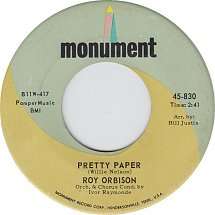Pretty Paper (song)
"Pretty Paper" is a song written by country music singer-songwriter Willie Nelson in 1963. After being signed to Monument Records, Nelson played the song for producer Fred Foster. Foster pitched the song to Roy Orbison, who turned it into a hit. Nelson recorded his own version of the song in November 1964.
| "Pretty Paper" | ||||
|---|---|---|---|---|
 | ||||
| Single by Roy Orbison | ||||
| B-side | "Almost" | |||
| Released | 1963 | |||
| Genre | Christmas, country | |||
| Length | 2:41 | |||
| Label | Monument | |||
| Songwriter(s) | Willie Nelson | |||
| Producer(s) | Fred Foster | |||
| Roy Orbison singles chronology | ||||
| ||||
Content
The song tells the story of a street vendor who, during the holiday season, sells pencils and paper on the streets.[1] In October 1963, while walking in his farm in Ridgetop, Tennessee, Nelson was inspired to write the song after he remembered a man he often saw while he lived in Fort Worth, Texas.[2] The man had his legs amputated and moved with rollers, selling paper and pencils in front of Leonard's Department Store.[3] To attract the attention of the people, the man announced, "Pretty paper! Pretty paper!"[2]
In 2013, the Fort Worth Star-Telegram identified the man as Frankie Brierton, of Santo, Texas. Brierton refused to use a wheelchair, choosing instead to crawl, as he learned to move while growing up after his legs were affected by a spinal disorder. Brierton sold pencils in Fort Worth, Dallas and Houston. As noted in the Star-Telegram article, Brierton suffered from childhood meningitis, and while both legs below the knee were atrophied, they were not amputated.[4]
Background and recording
Early in 1963, Nelson was signed by Fred Foster to the label Monument Records.[5] In October 1963, Nelson sang "Pretty Paper" for Foster, who was impressed and decided to forward the song to Roy Orbison in London. Bill Justis worked the arrangements and the demo tape was sent to Orbison in England.[6] According to Marcel Riesco's research for the official Roy Orbison biography,[7] The Authorized Roy Orbison, "Pretty Paper" was recorded at Decca Studio 2 in London with music director Ivor Raymonde, who made last-minute arrangements with his orchestra. Each musician was provided with microphones newly designed by Decca Records' engineers. The microphones were worn around the neck to amplify the strings. Orbison attended the session with a 102-degree fever.[3] According to Riesco's research, Orbison recorded the song in 12 takes. The B-side, "Almost," [6] was also done that day.
Release
The record by Orbison was released in November 1963. The song peaked at number 10 on Billboard's Adult Contemporary Chart, 15 on the Billboard Hot 100 and 27 on the Christmas Singles Chart.[1] The record was released in the UK in November 1964 and peaked at number 6 on the UK Singles Chart. The song was included on More of Roy Orbison's Greatest Hits in 1964, and has appeared on numerous compilations through the years.
Other recordings
After moving to RCA Records in November 1964, Willie Nelson recorded his own version, produced by Chet Atkins. The musicians for the session were Hargus "Pig" Robbins (piano), Pete Drake (pedal steel), Henry Strzelecki (bass), Kenneth Buttrey (drums), Jerry Reed (guitar) and Velma Smith (guitar). Nelson recorded for the B-side "What a Merry Christmas This Could Be". Nelson returned to the studio in December and recorded with the melody of the song in phonetic German the song "Little Darling".[8] Nelson re-recorded the song for his 1979 album Pretty Paper, and once more with his sister Bobbie Nelson for their 1997 album Hill Country Christmas.
There have been numerous cover versions of the song, by artists including Glen Campbell (1968), Mickey Gilley (1976), Randy Travis (1986), Asleep at the Wheel (1997), Kenny Chesney (2003), Chris Isaak (2004), Reverend Horton Heat (2005), Emmy Rossum (2013), The Lumineers (2018), and dozens of others.
Footnotes
- Crump, William 2001, p. 342, 343.
- Nelson, Willie; Ritz, David 2015, p. 167.
- Patoski, Joe Nick 2008, p. 154.
- Star-Telegram staff 2013.
- Scobey, Lola 1982, p. 190.
- Kruth, John 2013, p. 64.
- Orbison, Alex (2017). The Authorized Roy Orbison. Orbison, Wesley; Orbison, Roy Jr.; Slate, Jeff; Riesco Marcel (First ed.). New York: Center Street. ISBN 9781478976547. OCLC 1017566749.
- Patoski, Joe Nick 2008, p. 158.
References
- Orbison, Alex; Orbison, Wesley; Orbison, Roy Jr.; Slate, Jeff; Riesco, Marcel (2017). The Authorized Roy Orbison. Center Street. ISBN 978-1-478-97654-7
- Crump, William (2001). The Christmas Encyclopedia (3rd ed.). McFarland. ISBN 978-1-476-60573-9.CS1 maint: ref=harv (link)
- Kruth, John (2013). Rhapsody in Black: The Life and Music of Roy Orbison. Hal Leonard Corporation. ISBN 978-1-480-35492-0.CS1 maint: ref=harv (link)
- Lankford Jr., Ronnie (2008). "Roy Orbison - Pretty Paper (Composed by Willie Nelson)". Allmusic. Rovi Corporation. Missing or empty
|url=(help)CS1 maint: ref=harv (link) - Nelson, Willie; Ritz, David (2015). It's A Long Story: My Life. Little, Brown and Company. ISBN 978-0-316-33931-5.CS1 maint: ref=harv (link)
- Patoski, Joe Nick (2008). Willie Nelson: An Epic Life. Hachette Digital. ISBN 978-0-316-01778-7.CS1 maint: ref=harv (link)
- Scobey, Lola (1982). Willie Nelson: Country Outlaw. Kensington Pub Corp. ISBN 978-0-89083-936-2.CS1 maint: ref=harv (link)
- Star-Telegram staff (December 16, 2013). "The Mystery of "Pretty Paper" Is Unwrapped". Fort Worth Star-Telegram. Willie Nelson.com. Retrieved December 19, 2014.CS1 maint: ref=harv (link)